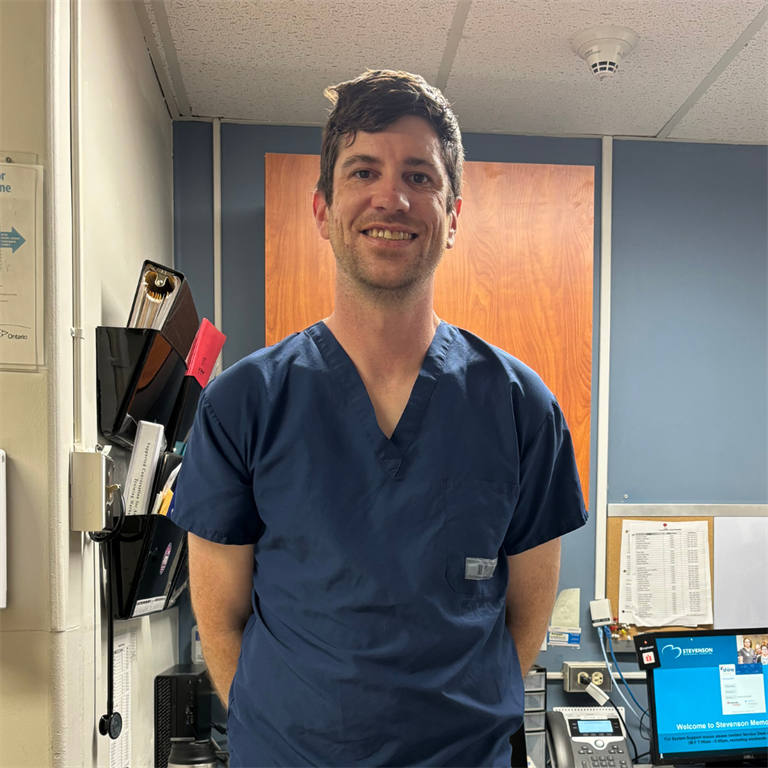Matthew Gillard, Physiotherapy Assistant
May 13, 2025
In recognition of Physiotherapy Assistant Day and Physiotherapy Month, we’re shining a spotlight on one of our dedicated team members, Matthew Gillard, who brings compassion, resilience, and heart to his work every day.

Tell us about your role and what led you to Stevenson Memorial Hospital.
“I am a Physiotherapy Assistant on the Med-Surg unit. I was trained at Georgian College as an Occupational Therapy Assistant and Physiotherapy Assistant. I pivoted later in life into healthcare from the public sector, returning to school in 2020, mainly because I wanted to enter the helping field. I really wanted to enter a field where I could help improve people’s day-to-day lives. While folks feeling ill don’t always want to see me in the moment, I know that our goals are aligned in the sense that nobody wants to be in the hospital longer than they need to be—I value supporting people achieve their goal of returning home, whether that’s directly from hospital or via another route, like rehab.”
What does a typical day look like in your role? “My typical day starts with reading documentation and familiarizing myself with the caseload, as people on the unit can come and go quickly and can change from day to day. Immediately prior to rounds, I liaise with the physiotherapist, who provides my assigned tasks for the day. The rest of the day is split between completing patient treatment for those assigned to me and assisting the PT with new assessments and discharge. My day typically ends by completing documentation that I was not able to complete during the flow of the day.”
What do you enjoy most about working in physiotherapy? “I think what I enjoy most about physio is being part of the healing process. Whether that is helping someone out of bed for the first time since a surgery or seeing a former patient, who was in a wheelchair, walk back into the hospital months later, I love to see the growth and healing that can be accomplished in the face of great sickness and/or trauma. The resilience and strength of many of the people I get to work with is impressive. I have also had the opportunity to listen to patients share incredible personal stories.”
What’s one thing you wish more people understood about physiotherapy? “The scope of practice in acute care is more focused on intake and discharge planning rather than treatment. Sometimes the expectations of our role can be more in line with what a rehab hospital or clinic might provide.”
Can you share a memorable moment or patient success story that’s stuck with you? “I can think of two particular moments that have really stuck with me. The first moment that I think of is when a former patient, who had to virtually learn how to walk again with me, was able to stroll into the hospital independently. To know where they started from and to see where they had got to was affirming of the value of my role. The second one was the opportunity to hear stories from an older gentleman from Holland who lived through World War II—the stories he shared with me were both harrowing and a living history of the increasingly distant past. I really valued his openness to share these stories with me.”
How do you and your team support patients on their recovery journeys, physically and emotionally?
“Physically, we support patients to get and keep moving so that they can continue their health journey outside of our hospital—we support patients to achieve their discharge goals, whether that’s returning home or heading elsewhere. Because of the nature of my role, I have the opportunity to speak with patients more extensively because of the time we have together while ambulating. As such, I can provide emotional support by acting as a sounding board to listen to patient concerns, affirm progress when the patient can’t always see it, and offer kind words and support when needed. While my focus may be on the physical, the nature of my role is implicitly social; as such, to achieve physical goals, I need to support the mental and emotional components of the whole person.”
What has working in this field taught you about resilience and healing? “Working in this field has taught me so much about resilience. I have had the opportunity to witness folks who have suffered strokes relearn to use their affected limbs; to hear people who have suffered burns covering most of their body cracking jokes while exercising; to see octogenarians still supporting their loved one of 50 years as a caregiver.”
How has physiotherapy changed or evolved since you started? “Mainly, the biggest change is with infection control following the pandemic, which has affected everyone’s role in the hospital.”
What does being recognized during Physiotherapy Month mean to you? “It is nice to be able to share some of the stories of resilience and healing that I have had the opportunity to experience.”
What advice would you give to someone considering a career in physiotherapy?
“For anyone considering a career in physiotherapy at a hospital: get used to meeting new people all the time.”
Thank you to Matthew and the rest of our small but mighty physiotherapy team for the incredible work you do every day. Your dedication, compassion, and commitment to helping patients regain strength and independence does not go unnoticed. We’re proud to celebrate you this Physiotherapy Assistant Day—and all year long!